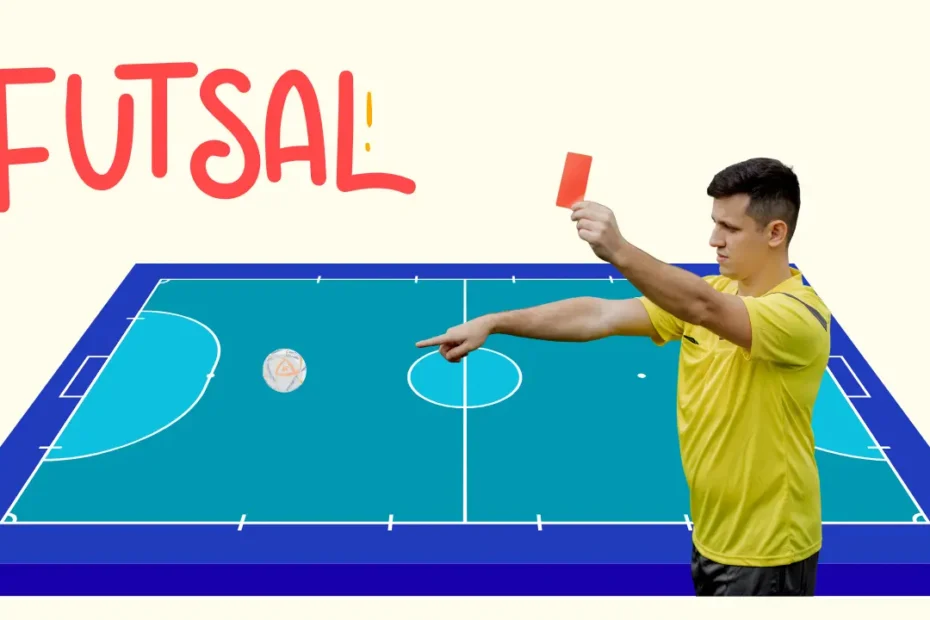Roles of Futsal Referees: The Ultimate Authority on the Court
Understand the roles of futsal referees, their powers, duties, and how their decisions impact the game. An essential and updated guide on the ultimate authority on the courts.
In the dynamic and fast-paced world of futsal, one figure is essential to ensure order, fairness, and the enforcement of the rules: the futsal referees. They are the ultimate authority on the court, and their decisions are final for the development of the match.
But do you know exactly what the roles, powers, duties, and responsibilities of Futsal referees are? Dive into this complete guide and understand the crucial role of the refereeing team in every game.
The Authority and Final Decisions of Futsal Referees
Each futsal match is controlled by two referees: the main referee and the second referee. Together, they hold full authority to enforce the Futsal Laws of the Game.
The decisions made by the refereeing duo regarding facts connected with play are final and must always be respected. This includes everything from calling a foul to validating a goal and, consequently, the final result of the game.
Once the game is restarted, the referees cannot change a decision, even if they realize they have made a mistake. The only exception is for applying a disciplinary measure (like a card) that was indicated by another match official but not seen by the referees before the restart. In case of disagreement between the main referee and the second referee, the main referee’s decision prevails.
Powers and Duties of Futsal Referees: The Multiple Functions of Officiating
Futsal referees have a wide range of powers and duties to ensure the smooth running of the match. Their responsibilities include:
Game Control and Rule Enforcement
- Enforcing the Futsal Laws of the Game: This is their main function.
- Controlling the game: They act in cooperation with the other members of the officiating team (timekeeper and third referee).
- Ensuring compliance: They check if the ball and the players’ equipment meet the official requirements of the rules.
- Recording incidents: They keep a record of all relevant events of the match.
Interruptions and Incident Management
Referees can and must stop, suspend, or even terminate a game for any infringement of the rules or for serious external interference. Examples include:
- Inadequate lighting on the court.
- An object thrown by a spectator that hits someone on the court.
- The entry of an unauthorized object, animal, or person that interferes with the game.
- A whistle from the stands that disrupts the players.
Injury Management and Medical Attention
Player safety is a priority. If a player is seriously injured, the referee stops the game so they can be removed from the court for treatment.
An injured player, as a rule, cannot be treated on the court. There are important exceptions:
- When players from the same team collide.
- In case of a serious injury.
- If the injury resulted from a foul that led to a card for the opponent.
- When a penalty kick is awarded and the injured player is the kicker or the goalkeeper.
Furthermore, any player who is bleeding must leave the court and can only return with the referees’ permission, after the bleeding has been stopped.
Disciplinary Measures: Cards and Sanctions
- Punishing infringements: Referees issue yellow cards (caution) and red cards (sending-off) to players who commit infringements. This action can be taken immediately or at the next stoppage of play.
- Managing team officials: Members on the bench who do not act in a responsible manner may be verbally warned, shown cards, or dismissed from the technical area. If the offender cannot be identified, the head coach receives the sanction.
Limited Liability of the Refereeing Team in Futsal
It is important to note that futsal referees and other members of the officiating team are not legally liable for injuries suffered by players, damage to property, or any other loss that may occur due to their decisions, provided these are made in accordance with the Laws of the Game. This includes decisions about the condition of the court, suspension of matches, or the suitability of equipment.
Futsal Referee Equipment: What Do They Carry?
To perform their duties, referees need specific equipment.
Mandatory Equipment:
- Whistle (at least one)
- Red and yellow cards
- Notebook or other means to record the match
- Watch (at least one)
Other Permitted Equipment:
- Communication systems to talk with the other referees.
- Electronic performance and tracking systems (EPTS).
Referees are prohibited from wearing jewelry or any other electronic equipment, such as cameras.
Technology in Futsal: Video Support (VS)
Video Support (VS), or video referee in Futsal, is already a reality in modern futsal, but its use is only permitted in competitions that follow the FIFA protocol.
VS can be triggered in crucial, game-changing situations, usually by a challenge from the head coach. The reviewable situations are:
- Goal/no goal: To check if the ball crossed the line or if there was an infringement in the build-up.
- Penalty/no penalty: Analysis of key incidents inside the penalty area.
- Direct red cards: To confirm or cancel a direct sending-off (this does not apply to a second yellow card).
- Mistaken identity: To correct a card given to the wrong player.
Referees can also use VS on their own initiative to resolve a disagreement between them or in cases of a malfunctioning chronometer. The initial decision is only changed if the review shows a “clear and obvious error” or a “serious missed incident.”
More Futsal content
- VIDEO: Main Futsal Rules
- All About Futsal Equipment
- Unauthorized Return of a Player in Futsal
- Futsal Rules for Goalkeepers
- The Positions of Futsal Players
- The Futsal Court
- Futsal Techniques
- All the Official Futsal Rules
